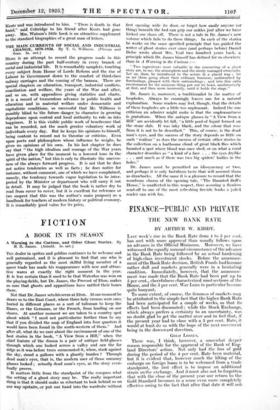THE MAIN CURRENTS OF SOCIAL AND INDUSTRIAL
CHANGE, 1870-1924. By T. G. Williams. (Pitman and Sons. 5s. net.) HERE is an attempt to record the progress made in this country during the past half-century in every branch of social and industrial life. It is remarkably complete, touching every subject from House of Lords Reform and the rise of Labour to Government down to the comfort of third-class' railway carriages and the coming of the banana. There are special chapters on education, transport, industrial conflicts, conciliation and welfare, the years of the War and after, and so on, with appendices giving statistics and charts. It is a record of tremendous advance in public health and education and in material welfare under democratic and capitalistic conditions, so successful that Mr. Williams is possibly blind to the future -danger_to character in growing dependence upon central and local authority to rule us into happiness. It is this visible public work of beneficence that can be recorded, not the much greater voluntary work of individuals every day. But he keeps his opinions to himself, being content to record not to theorize or criticize. Even upon poets and philosophers whose influence he weighs, he gives no opinions of his own. In his last chapter he does say that " the high idealism and courage of the War years have given place for the moment to a lowered tone in the spirit of the nation," but this is only to illustrate the uneven- ness of the always forward progress. It is not that he does not notice tendencies as well as facts ; he does notice for instance, without comment, one of which we have complained, namely, the tendency towards vague legislation to be inter- preted by the Minister or department who will carry it out in detail. It may be judged that the book is rather dry to read from cover to cover, but it is excellent for reference or (we suspect that this was the author's main purpose) as a handbook for teachers of modern history or political economy. R is remarkably good value for its price.






















































 Previous page
Previous page